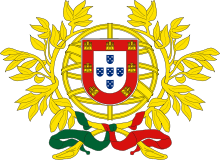Portuguese legislative election, 1979
| | |||||||||||||||||||||||||||||||||||||||||||||||
| |||||||||||||||||||||||||||||||||||||||||||||||
| |||||||||||||||||||||||||||||||||||||||||||||||
| | |||||||||||||||||||||||||||||||||||||||||||||||
| The first and the second most voted parties in each district (Azores and Madeira are not shown) | |||||||||||||||||||||||||||||||||||||||||||||||
| |||||||||||||||||||||||||||||||||||||||||||||||
| Portugal |
 This article is part of the series: |
The Portuguese legislative election of 1979 took place on 2 December. The last election, three and a half years before, in April 1976, was won by the Socialist Party under the lead of Mário Soares, who became the Prime-Minister of the 1st Constitutional government after the revolution. However, the government suffered several attacks and in December 1977, Soares lost the voting of a confidence resolution because all the opposition, the Democratic and Social Center, the Social Democrats and the Communists united in order to vote against it, and so, the Soares' government fell. Soares would become Prime-Minister again in January 1978, in coalition with the Democratic Social Center, but in July this party would force the end of the government due to disagreements about agrarian reform. In August, Nobre da Costa became Prime-Minister by personal decision of the President of President Ramalho Eanes, after a failed attempt to unite the parties on the Parliament. However, the program of Nobre da Costa's government was never approved and two months later, da Costa was replaced by Mota Pinto who would govern with extreme difficulties for less than one year.
In July 1979, the President finally decided to dissolve the Parliament and call for a new election for December. Mota Pinto was replaced in the period between the dissolution and the election by Maria de Lourdes Pintasilgo (the only women to lead a government in Portugal). The right-wing parties, the Social Democratic, the Democratic and Social Center and the People's Monarchist Party united in the Democratic Alliance (Portuguese: Aliança Democrática or AD) under the lead of Sá Carneiro won the election, receiving 43% of the vote. The Socialists lost more than 30 MPs and the Communists, now allied with the Portuguese Democratic Movement in the United People Alliance achieved their highest total ever, with almost 20% of the voting.
Parties
The major parties involved and the respective leaders:
- United People Alliance (APU), Álvaro Cunhal
- Socialist Party (PS), Mário Soares
- Democratic Alliance (AD), Francisco Sá Carneiro
The leader of the Democratic Alliance, Francisco Sá Carneiro, member of the Social Democratic Party was nominated Prime-Minister.
National summary of votes and seats
| Parties | Votes | % | ± | Seats | ||||||
|---|---|---|---|---|---|---|---|---|---|---|
| 1976 | 1979 | ± | % | ± | ||||||
| Democratic Alliance[A] | 2,554,458 | 42.52 | N/A | N/A | 121 | N/A | 48.40 | N/A | ||
| Social Democratic[B] | 141,227 | 2.35 | N/A | 73 | 7 | N/A | 2.80 | N/A | ||
| Democratic and Social Centre[B] | 23,523 | 0.39 | N/A | 42 | 0 | N/A | 0.00 | N/A | ||
| Total Democratic Alliance | 2,719,208 | 45.26 | 1151 | 128 | 51.20 | |||||
| Socialist | 1,642,136 | 27.33 | 107 | 74 | 29.60 | |||||
| United People Alliance[C] | 1,129,322 | 18.80 | 40 | 47 | 18.80 | |||||
| People's Democratic Union | 130,842 | 2.18 | 1 | 1 | 0.40 | |||||
| Christian Democratic Party | 72,514 | 1.21 | 0 | 0 | 0.00 | |||||
| Workers' Communist Party | 53,268 | 0.89 | 0 | 0 | 0.00 | |||||
| UEDS | 43,325 | 0.72 | N/A | N/A | 0 | N/A | 0.00 | N/A | ||
| Revolutionary Socialist Party | 36,978 | 0.62 | 0 | 0 | 0.00 | |||||
| Workers Party of Socialist Unity | 12,713 | 0.21 | N/A | N/A | 0 | N/A | 0.00 | N/A | ||
| OCMLP | 3,433 | 0.06 | N/A | N/A | 0 | N/A | 0.00 | N/A | ||
| Total valid | 5,843,739 | 97.28 | 263 | 250 | 100.00 | |||||
| Blank ballots | 42,863 | 0.71 | — | |||||||
| Invalid ballots | 120,851 | 2.01 | ||||||||
| Total (turnout 82.86%) | 6,007,453 | 100.00 | ||||||||
| A Alliance formed by the Social Democratic Party (73 seats), the Democratic and Social Centre (43 seats) and the People's Monarchist Party (5 seats). B Social Democratic Party and Democratic and Social Centre electoral list only in Azores and Madeira. C Portuguese Communist Party (44 MPs) and Portuguese Democratic Movement (3 MPs) ran in coalition.[3] | ||||||||||
| Source: Comissão Nacional de Eleições | ||||||||||
1 Democratic Alliance results are compared to the combined totals of the Social Democratic Party, the Democratic and Social Centre and the People's Monarchist Party in the 1976 election.
Distribution by constituency
| Constituency | % | S | % | S | % | S | % | S | % | S | Total S |
|---|---|---|---|---|---|---|---|---|---|---|---|
| AD | PS | APU | PSD | UDP | |||||||
| Azores | 30.0 | 2 | 3.1 | - | 52.0 | 3 | 1.7 | - | 5 | ||
| Aveiro | 56.7 | 9 | 28.4 | 5 | 7.9 | 1 | 1.2 | - | 15 | ||
| Beja | 19.0 | 1 | 22.0 | 1 | 50.7 | 3 | 1.8 | - | 5 | ||
| Braga | 51.9 | 9 | 30.2 | 5 | 10.0 | 1 | 1.4 | - | 15 | ||
| Bragança | 60.7 | 3 | 22.2 | 1 | 5.8 | - | 1.9 | - | 4 | ||
| Castelo Branco | 49.9 | 4 | 27.8 | 2 | 12.4 | - | 1.9 | - | 6 | ||
| Coimbra | 44.8 | 6 | 35.1 | 5 | 11.2 | 1 | 1.3 | - | 12 | ||
| Évora | 26.9 | 1 | 16.9 | 1 | 48.9 | 3 | 1.7 | - | 5 | ||
| Faro | 34.6 | 4 | 34.0 | 3 | 20.3 | 2 | 3.2 | - | 9 | ||
| Guarda | 60.6 | 4 | 26.3 | 1 | 5.4 | - | 0.9 | - | 5 | ||
| Leiria | 56.2 | 7 | 23.2 | 3 | 10.9 | 1 | 1.5 | - | 11 | ||
| Lisbon | 40.0 | 24 | 25.8 | 15 | 26.0 | 16 | 2.8 | 1 | 56 | ||
| Madeira | 17.2 | 1 | 3.1 | - | 57.8 | 4 | 6.6 | - | 5 | ||
| Portalegre | 32.1 | 2 | 29.8 | 1 | 29.4 | 1 | 1.7 | - | 4 | ||
| Porto | 44.5 | 18 | 34.8 | 14 | 14.5 | 6 | 1.9 | - | 38 | ||
| Santarém | 41.3 | 6 | 27.3 | 3 | 21.7 | 3 | 2.2 | - | 12 | ||
| Setúbal | 22.3 | 4 | 21.4 | 4 | 47.0 | 9 | 4.0 | - | 17 | ||
| Viana do Castelo | 54.8 | 4 | 24.9 | 2 | 9.8 | - | 0.9 | - | 6 | ||
| Vila Real | 57.7 | 4 | 21.4 | 2 | 6.1 | - | 1.5 | - | 6 | ||
| Viseu | 64.1 | 8 | 21.4 | 2 | 5.5 | - | 1.4 | - | 10 | ||
| Europe | 38.3 | 1 | 33.2 | 1 | 13.4 | - | 5.7 | - | 2 | ||
| Rest of the World | 77.3 | 2 | 5.7 | - | 3.1 | - | 0.7 | - | 2 | ||
| Total | 42.5 | 121 | 27.3 | 74 | 18.8 | 47 | 2.4 | 7 | 2.2 | 1 | 250 |
| Source: Comissão Nacional de Eleições | |||||||||||
Notes
- ↑ As leader of the Social Democratic Party (PSD).

_square.jpg)